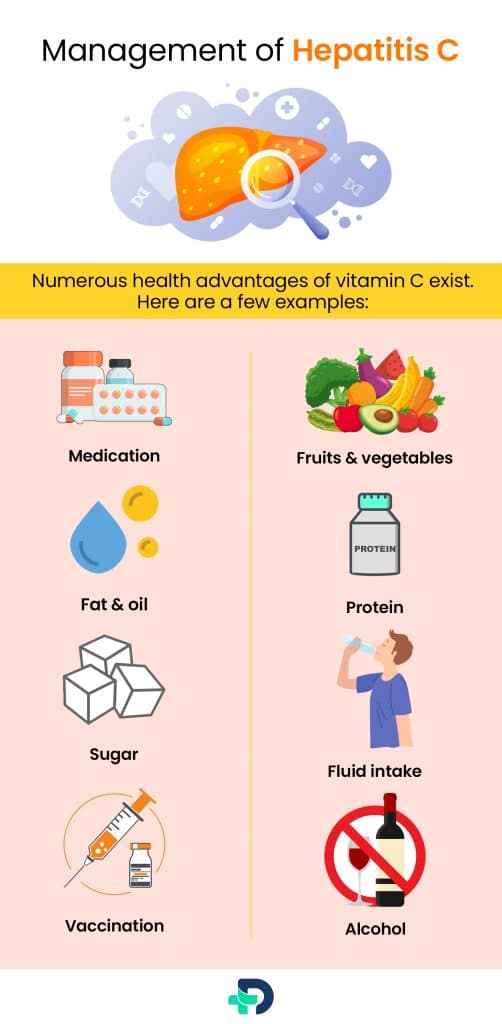Hepatitis C: Causes, Symptoms, and Management

- Hepatitis C
- 16 Aug 2023
Overview
What is Hepatitis C?
Hepatitis C is an illness resulting from the intrusion and proliferation of viruses, triggering the body’s innate immune response to combat the infection and causing harm or injury to the liver. Organs can be harmed by the innate immune response generated.1Overview| Researched based study from Niddk.nih.gov Hepatitis C viruses (HCVs) cause the infection and these spread through the blood. While HCV infection can manifest for a relatively brief duration, it progresses into a persistent infection in over half of those affected. Chronic HCV infection poses a significant health risk as it can give rise to severe medical complications, potentially leading to mortality.2Overview| Researched based study from Hhs.gov

Types
Types of hepatitis C Infection
There are two types: acute or chronic infection
Acute hepatitis C
- It is a transient infection. Symptoms might linger for up to 6 months. Sometimes the body may fight against the infection and the virus disappears. However, for the majority of people, an acute infection leads to a chronic infection.
Chronic hepatitis C
- It is a persistent infection. If not treated, it can continue throughout a person’s life and cause major health concerns such as damage to the liver, liver scarring, carcinoma of the liver, and in some cases death.3Types| Researched based study from Medlineplus.gov
Causes
What causes hepatitis c?
Hepatitis C can emerge when HCV-infected blood enters the body of a healthy individual. Contact with an infected person occurs due to the following:
- Exchanging needles to inject drugs or other drug-related things with an infected individual
- Receiving a stick from a needle used on an infected individual
- Getting tattoos or piercings with equipment and inks that are neither sterilized nor free from viruses and other microorganisms, and these have been previously used on individuals who have already contracted the infection.
- Coming into contact with the blood or open sores of an infected person.
- Being born to a hepatitis C-positive mother.
- Engaging in unprotected sexual activity with an infected person
- Using personal items of an infected person such as shaving products, toothbrushes, or clippers to clip the nails.
However, Hepatitis C cannot be transmitted through the following:
- Coughing or sneezing of an infected person
- Consuming food or water
- Hugging or contact like shaking hands or holding hands with an infected person
- Sharing eating utensils like spoons or dishes with an infected person or sitting next to them
- Breastfeeding to a baby.1Causes| Researched based study from Niddk.nih.gov
Symptoms
Hepatitis C symptoms
Symptoms of Hepatitis C may not be apparent in most individuals who have recently contracted the virus. Certain individuals may experience the development of jaundice, in cases of chronic infection, symptoms may not be noticeable.
However, some individuals may experience tiredness, exhaustion, or lack of energy and mental disorders. Individuals who have chronic Hepatitis C may not experience symptoms until their liver becomes scarred, resulting in cirrhosis. At this stage, people may experience various health problems and may be considered ill.
Symptoms of HCV infection may include the following:
- Pain experienced in the upper right part of the abdomen
- A change in the color of stools to pale or clay-like
- Swelling of the abdomen caused by the accumulation of fluid, also known as ascites
- Darkening of urine
- Lack of energy
- Pruritus
- Elevated body temperature
- Yellowing of the skin and whites of the eyes
- A decreased desire to eat
- A feeling of discomfort in the stomach that may be accompanied by an inclination to vomit
- Vomiting 4Symptoms| Researched based study from Pennmedicine.org
Diagnosis
Diagnosis of hepatitis C
Hepatitis C is typically diagnosed by administering two blood tests, namely, the antibody test and the PCR test. The results of these tests are usually available within a period of two weeks.
Testing for antibodies
- To diagnose Hepatitis C, healthcare providers typically use an antibody blood test to detect the presence of antibodies that the immune system produces to fight the virus. However, it may take several months for these antibodies to appear in the blood after infection, meaning the test may not show positive results immediately after infection.
- In cases where a person has symptoms of Hepatitis C or has been exposed to the virus but tests negative for antibodies, they may be recommended to undergo another test. If the initial test comes back positive, it indicates that the individual has been infected with the virus at some point in the past, although it does not necessarily mean that the person is currently infected, as the virus may have cleared from their body.
- To ascertain the current infection status of an individual, a follow-up blood test known as a PCR test is required.
PCR test
- The PCR blood test is employed to detect the presence of the Hepatitis C virus in the body by assessing its active replication status.
- If the test comes back positive, it indicates that the virus is still present in the body, and the person is currently infected.
Other tests
- In the event of an active Hepatitis C infection, a specialist will be consulted to conduct additional tests to evaluate the extent of liver damage.
- The tests may involve measuring specific enzymes and proteins in the blood that indicate liver inflammation or damage, as well as ultrasound scans to determine the stiffness of the liver, which can indicate scarring.
- The specialist can also discuss any necessary treatment options with the patient.5Diagnosis| Researched based study from Nhs.uk
Risk
Who are at risk?
Individuals who are at an increased risk of contracting hepatitis C include:
- Those with HIV infection,
- Current or former injection drug users (IDUs), even those who only injected once many years ago,
- Those with certain medical conditions such as a history of maintenance hemodialysis,
- Individuals who have received blood transfusions or organ transplants,
- Those who were treated with clotting factor products prior to 1987, or received a transfusion of blood or blood products prior to July 1992, As of July 1992, individuals who received an organ transplant,
- Healthcare professionals who encounter needle sticks or exposure of mucous membranes to blood that has been confirmed to be positive for HCV,
- Individuals who have been informed that they received blood from a donor who was subsequently diagnosed with HCV infection, and
- The offspring, referring to the children, who are born to mothers who are infected with the hepatitis C virus, which indicates that these mothers have an ongoing HCV infection in their bodies at the time of childbirth.6Risk| Researched based study from Cdc.gov
Complications
Associated complications of hepatitis C
Scarring of the liver
- When a person develops cirrhosis, the liver becomes increasingly damaged as the scar tissue gradually replaces the healthy liver tissue. As a consequence, the liver may experience impaired functionality, resulting in a variety of health problems.
- Without treatment, hepatitis C can lead to the development of liver scarring or cirrhosis, which may occur after 20 or more years since the initial infection.
- Consuming alcoholic beverages, smoking, and having excess body weight are all factors that can raise the risk of developing the condition.
- Furthermore, the risk of developing cirrhosis can also increase if a person has type 2 diabetes, acquire hepatitis C at an older age, have HIV infection, or have co-infection with another type of hepatitis, such as hepatitis B.
Symptoms of scarring include
- A strong sensation of itchiness or irritation on the skin
- A decrease in body weight
- Lack of energy or fatigue
- Discomfort or soreness in the abdominal area
- Jaundice, and small, dilated blood vessels that appear close to the surface of the skin
Deterioration in liver function
- A severe deterioration in liver function, known as end-stage liver disease, occurs when the functioning capacity of the liver decreases due to extensive damage or scarring.
- For people with hepatitis-associated cirrhosis, about 1 in every 20 individuals will develop liver failure each year.
Liver failure can cause various symptoms such as
- Loss of hair
- Easy bruising
- Edema
- Fluid buildup in the abdomen
- Dark, tarry stools or very light-colored stools
- Dark-colored urine
- Vomiting blood
- Yellowing of the whites of the eyes or skin
Liver cancer
Symptoms include
- Yellowing of the skin and eyes,
- Abdominal pain or swelling,
- Fatigue,
- Nausea,
- A decrease in the desire to eat or a reduced interest in food
- Losing weight without intending to do so.7Complications| Researched based study from Nhs.uk
Management

Management of hepatitis C
Medication
Antiviral medications are used to treat Hepatitis C virus infection, and they come in the form of oral pills. These pills are taken once a day and are very effective in attacking the virus and preventing its reproduction.
- First-line regimen for treatment of patients with chronic hepatitis C infection a combination consisting of elbasvir and grazoprevir, Sofosbuvir and velpatasvir, Glecaprevir co-formulated with pibrentasvir or a combination of ledipasvir and sofosbuvir
- Second line hepatitis C medication is a combination of sofosbuvir, velpatasvir, and voxelaprevir.8Management| Researched based study from Hepatitis.va.gov
The length of treatment for hepatitis C typically lasts from 8 to 12 weeks, although it can be as long as 16 weeks in certain cases. However, some patients with severe liver damage may require 24 weeks of treatment, although this is uncommon.
What food one should take in hepatitis c infection?
Fruits & vegetables
- Eating a variety of fruits and vegetables is crucial for maintaining liver function due to the vitamins they contain, including antioxidants such as beta-carotene and vitamin C. It is recommended to consume at least 5 portions of plant-based foods per day.
Fat & oil
- Most individuals with Hepatitis C need not have to completely eliminate fats and oils from their diet. However, those who are overweight, have been diagnosed with a fatty liver, or have high cholesterol levels should lower their fat intake as this can potentially improve liver function.
Protein
- A balanced diet with adequate protein is important, but excessive amounts of protein are not necessary and may even be harmful.
Fluid intake
- Adequate daily fluid intake is essential. The advised quantity is a minimum of 6 to 8 glasses of fluids per day.
Sugar
- Sugar is a source of energy but provides no significant nutrients. Hence, it is advisable to consume sugar in moderate amounts.
Other tips
- It is recommended that people with Hepatitis C avoid eating very rich, greasy, or fatty foods, as these can cause discomfort or nausea after eating.9Management| Researched based study from Nhs.uk
Precautions one should take if diagnosed hepatitis C
Vaccination
- People diagnosed with hepatitis C are advised to receive vaccinations against hepatitis A and hepatitis B. This is because having hepatitis C can make a patient more vulnerable to developing hepatitis A or B, which can further damage the liver.
Alcohol
- Avoiding alcohol is recommended for people with hepatitis C. It can worsen liver damage and increase the risk of developing liver disease, including liver cancer, in people with hepatitis C.
Medication
- It is important for individuals with Hepatitis C to consult their doctor before taking any prescription medication, herbal supplements, or over-the-counter medications as they may have the potential to harm the liver.
- Skipping doses or changing the dosing schedule can reduce the effectiveness of the treatment and may lead to the virus becoming resistant to the medication.8Management| Researched based study from Hepatitis.va.gov
HIV testing
- It is recommended to get tested for HIV, as co-infection with both Hepatitis C and HIV can increase the risk of developing cirrhosis.10Management| Researched based study from Health.ri.gov
Prevention
Prevention of hepatitis C
- The use of clean and sterile injecting equipment is always recommended to prevent the spread of infections. Using someone else’s needles or engaging in the practice of sharing equipment used for injections is highly discouraged.
- Additionally, personal items that can cause bleeding should not be shared to avoid the risk of infection transmission.
- It is recommended to wear disposable gloves whenever possible when administering first aid or handling tasks involving the cleanup of blood or bodily fluids.
- When engaging in body piercing or electrolysis, one should make sure that any instrument that penetrates the skin has either been used only once or has undergone thorough cleaning and sterilization since its last use.11Prevention| Researched based study from Betterhealth.vic.gov.au
Prognosis
Prognosis
- The prognosis of hepatitis C depends on several factors, including the individual’s age, overall health, and whether they have developed complications such as cirrhosis or liver cancer.
- Hepatitis C’s acute phase is typically asymptomatic and seldom results in severe hepatitis.
- In the first six months of infection, roughly 15-45% of those affected eliminate the virus spontaneously.
- The remaining individuals develop chronic infection, with 15-30% at risk of liver cirrhosis.
- Patients with cirrhosis have a 5-year cumulative incidence of 5% for developing hepatocellular carcinoma.12Prognosis| Researched based study from Clinicbarcelona.org
Any feedback on this article?
 This Articles content was accurate
This Articles content was accurate Very Informative Article
Very Informative Article I have a question or a comment
I have a question or a comment
 This article contains inaccurate content
This article contains inaccurate content This article was not helpful
This article was not helpful I have a question or a comment
I have a question or a comment
We appreciate your helpful feedback!
Checkout our social pages
References
-
National Institute of Diabetes and Digestive and Kidney Diseases
Hepatitis C | Overview | Causes
-
Health and Human Services
Hepatitis C Basic Information | Overview
-
Medline Plus
Hepatitis C | Types
-
Penn Medicine
Hepatitis C | Symptoms
-
National Health Service
Hepatitis C | Diagnosis
-
Centers for Disease Control and Prevention
Hepatitis C Questions and Answers for Health Professionals | Risk
-
National Health Service
Hepatitis C | Complications
-
U.S. Department of Veterans Affairs
Hepatitis C medications: An overview for patients | Management
-
National Health Service
Dietary Advice if you have Hepatitis C | Management
-
Department of Health-State of Rhode Island
Hep C/HCV (Hepatitis C) | Management
-
Better Health Channel
Hepatitis C | Precaution
-
Clinic Barcelona
Viral Hepatitis | Prognosis






































